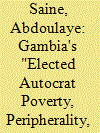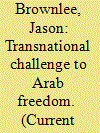| Srl | Item |
| 1 |
ID:
081225


|
|
|
|
|
| Publication |
2008.
|
| Summary/Abstract |
This article assesses "democratization" under military and quasimilitary regimes in the Gambia following the 1994 coup d'état until 2006. The "transition" program back to "civilian" rule in 1996, the 2001 and 2006 presidential elections, and the aftermath of deepening authoritarianism and economic crisis are also evaluated. The formation of a five-political party coalition, the National Alliance for Democracy and Development, in 2005 raised expectations for a new political dispensation. Its breakup in 2006, however, dashed hope of this occurring. President Jammeh won a third 5-year term amid suffocating external and domestic indebtedness, declining exports, poor economic performance, and endemic corruption. Continued poor leadership and policy choices are likely to exacerbate abject poverty, countercoups, instability, and conflict. McGowan's neo-Marxist/liberal political economy approach has helped rekindle more critical scholarship on the linkage between underdevelopment and conflict in Africa and the Third World as well as provide an antidote to neo-liberal economic policies.
|
|
|
|
|
|
|
|
|
|
|
|
|
|
|
|
| 2 |
ID:
140184


|
|
|
|
|
| Summary/Abstract |
Recent studies of autocratic liberalization adopt a rationalist approach in which autocrats’ motives and styles of reasoning are imputed or deduced. By contrast, I investigate these empirically. I focus on liberal social engineering in the Persian Gulf, where authoritarian state efforts to shape citizen hearts and minds conform incongruously to liberal ideals of character. To explain this important but under-studied variant on autocratic liberalization, I present evidence from rare palace ethnography in the United Arab Emirates, including analysis of the jokes and stories ruling elites tell behind closed doors and regular interviews with a ruling monarch. I find that autocrats’ deeply personal experiences in the West as young men and women supplied them with stylized ideas about how modern, productive peoples ought to act and how their own cultures underperform. The evidence also reveals that such experiences can influence autocrats, even years later, leading them to trust in Western-style liberal social engineering as the way forward, despite the risks. Ethnographic findings challenge the contemporary scholarly stereotype of the autocrat as a super-rational being narrowly focused on political survival, illustrating how memory and emotion can also serve as important influences over reasoning and can drive liberal change.
|
|
|
|
|
|
|
|
|
|
|
|
|
|
|
|
| 3 |
ID:
109152


|
|
|